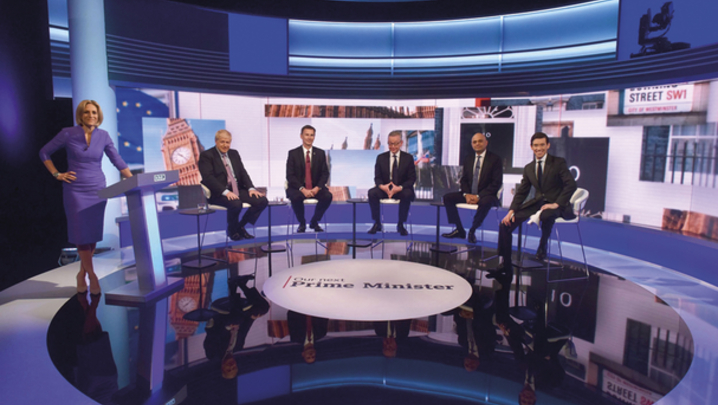Will Brexit liberate Britain's TV sector or will international media giants now abandon London for mainland Europe? Raymond Snoddy gauges opinion.
The “vote” of the UK’s independent television producers on the EU referendum could hardly have been more emphatic. The poll, conducted by Pact, the independent producers’ group, showed 85% in favour of remaining in the EU and 15% against – rather different from the UK’s vote.
There was no political campaign by Pact: the results were published but vanished into the pre-referendum maelstrom of claim and counterclaim.
Despite the overwhelming indie preference to remain, Pact CEO John McVay has very strong views on what should happen now: “The people have voted. Ultimately, the Government, a government, has to deal with that. Our job in the industry is not to ridicule the will of the British people but to make sure that things work better for our industry and that there is no long-term damage to our leading position.”
Producers want to be able to access top talent wherever it comes from and receive financial support from the UK government once Britain is cut off from the creative and regional development funds of the EU.
Potential benefits of Brexit include leaving behind everything from the EU’s state-aid restrictions to the strictures of the Digital Single Market.
According to McVay, it would be “a complete own goal” if issues surrounding control of the UK’s borders were to damage the creative industries. The sector is one of the fastest-growing areas of the economy, accounting for 6% of GDP.
“It is beholden to those of us who think we do have one of the world’s leading audio-visual sectors to fight in every way possible to ensure it remains so,” he adds.
John Newbigin, Chair of Creative England and a former Channel 4 executive, believes that the creative sector is the one most dependent on the free movement of labour and the EU’s financial support for innovation. He warns that the current instability is deeply damaging.
“No decisions are being made, contracts are being frozen or being lost. The Government has to act to reassure people, but, of course, it can’t – because we haven’t got a government, an opposition or a plan,” he laments.
The outlook among those who track the hard numbers and forecast the trends is bleaker still.
“It’s a disaster,” says Claire Enders, founder of research group Enders Analysis. She notes that the Brexit vote immediately knocked £18bn off the value of media stocks in the UK. ITV was badly hit because of its reliance on advertising.
"The creative industries... are now going to be in serious decline."
Shares can rise as well as fall, but Enders fears that the loss of three years’ worth of stock-market growth in the media sector will not quickly be made good. A remain vote, she believes, would have added 10% to the value of media stocks and the pound. In other words, the downside is even greater that it first appears. Enders predicts other big changes: “A financially weak Government is going to have few places to look for increased income. We will have a greater risk of privatisation of Channel 4 and privatisation of BBC assets.”
Guy Bisson, research director of Ampere Analysis, expects an immediate impact on the advertising market and advertising-funded television, “assuming that the predictions of an economic downturn are correct – and they probably are”.
One of his main concerns is the future of London as the centre for international channel groups dependent on the Audiovisual Media Services Directive (and Ofcom licences) to broadcast from the UK into all EU countries.
These international players like the relatively liberal British regulatory regime. Brexit, when it finally happens, could cause them real problems.
“Discovery has had big operations in the UK for 20 years but it would have to move any channel aimed at the EU and that’s just one aspect of one tiny industry,” Bisson argues.
Perhaps not so tiny: the revenues of the digital multichannel television business in the UK alone passed £5bn a year in 2015.
Big broadcasters, such as the BBC, are still trying to assess what Brexit means for them and are saying little. But for a “super-indie” such as Endemol Shine Group, the worries are already clear.
“We see ourselves as a pan-European success story,” says Richard Johnston, CEO of Endemol Shine UK. “We are headquartered in the Netherlands and London. We have made a success of freedom of ideas and people, from predominantly around the EU. That has been the story of our growth, which has brought lots of revenue and jobs to the UK.”
London will remain a strong TV market but anything that makes the flow of people and ideas across Europe more complicated would be unwelcome for programme-makers.
Following Brexit, Johnston believes that it is “certainly possible” that the Netherlands could become the sole HQ of the company. However, a reduced presence in London, rather than an exit, is more likely.
The Endemol Shine executive adds that tax credits for drama, an unqualified success, might be simplified in future because, at the moment, they have to navigate the EU’s state-aid restrictions.
On the other hand, Johnston notes that the UK’s audio-visual sector has received €44m from the EU’s Creative Europe programme, which started in 2014 – and €100m from its Culture programme, which ran 2007-13.
Stewart Purvis, a former ITN CEO and Ofcom partner for content and standards, points to the importance of the hundreds of international channels licensed by Ofcom in London.
He wonders what will happen to media competition policy and, indeed, the Audiovisual Media Services Directive itself, following Brexit.
"Turmoil favours the brave. Opportunity knocks."
The UK could gain the freedom to, for example, develop its own rules on how many advertising minutes are allowed in an hour. But he is surprised that new EU draft rules on the regulation of online content, which came out during the referendum campaign, were largely ignored.
Despite being a passionate remain supporter, Richard Williams, CEO of Northern Ireland Screen, believes that the inward-investment side of the UK screen industry can only gain from Brexit: he cities an improved exchange rate and freedom from state-aid rules.
The cultural test, in particular, says Williams, limits inward investment by “requiring projects attracting UK tax incentives to pass a test that they are sufficiently British or European to warrant support”.
But Game of Thrones, so important to the Northern Ireland television industry, is safe. In any case, the show no longer receives EU funding.
David Wolstencroft, co-author of Versailles, takes a very different, rather creative approach: “If Brexit was a storyline, it would be thrown out for being too implausible. Why would a country voluntarily hobble itself? First act is chaos; our second act will be a roller coaster of instability. What happens in the third is anyone’s guess. But there’s certainly a breathtaking array of antagonists.”
Fellow author Lord Dobbs, of House of Cards fame, could have a lively debate with Wolstencroft. “I happen to believe that [Brexit] will be creatively inspiring,” he says. “It’s a global world out there and, if we are to continue with the fabulous success of the British creative industry, we have to look not just across the channel but around the world.”
It is “bizarre”, Dobbs believes, that the UK creative sector should think it is dependent on contacts and payments from the bureaucracy of Brussels.
The House of Cards author is certain of one thing post referendum: “Political fiction is now dead. I’m going to attend the wake.
“I used to say that you take political reality and then you water it down to make it credible.”
Reality has now become just too extraordinary.






